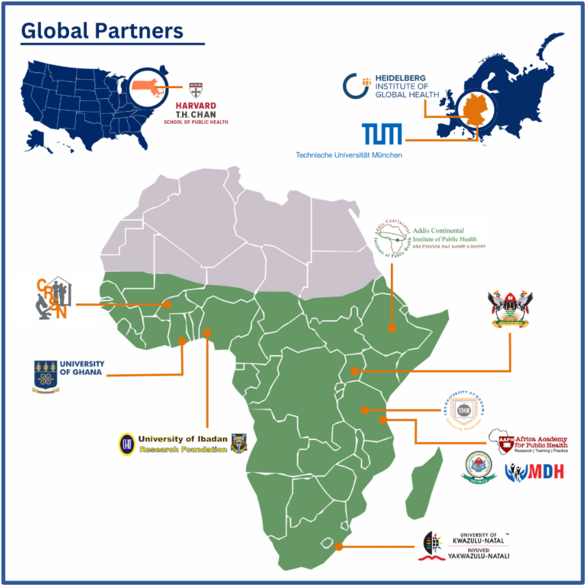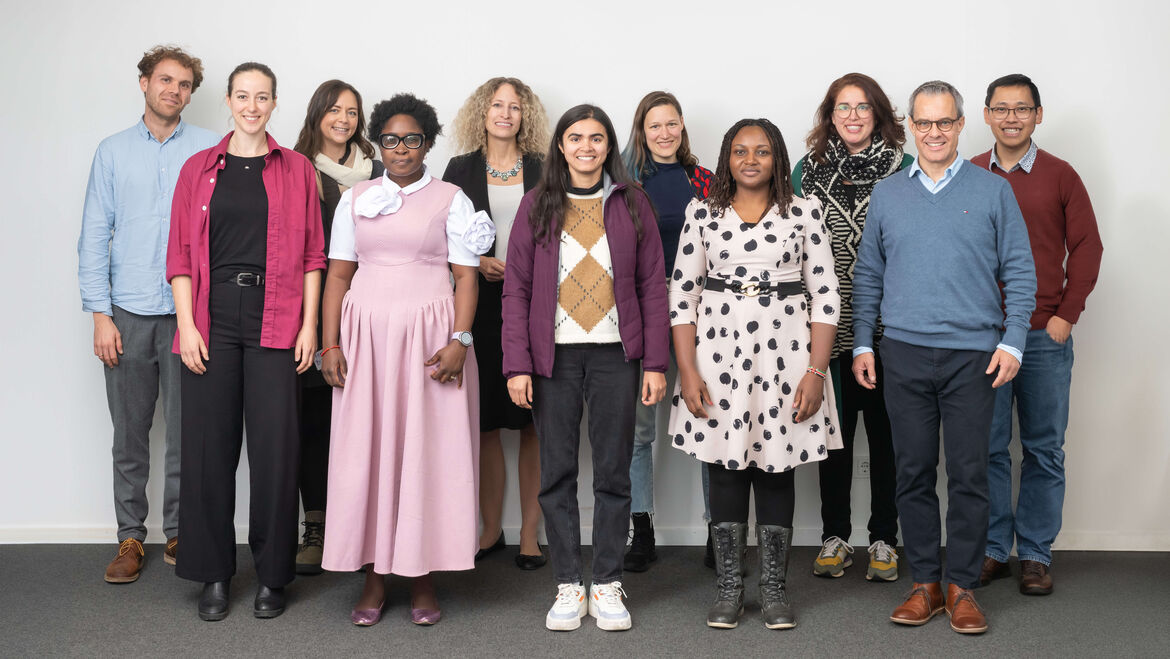
RESEARCH NETWORK FOR DESIGN AND EVALUATION OF ADOLESCENT HEALTH INTERVENTIONS AND POLICIES IN SUB-SAHARAN AFRICA
Acronym: DASH
Director: Dr. Mary Mwanyika Sando
Co-Director: Prof. Dr. Dr. Till Winfried Bärnighausen
Funding: The German Federal Ministry of Education and Research (BMBF)
Project Website: www.dash-rhissa.org
Participating Organizations:

Network Partners
1. Africa Academy for Public Health (AAPH)
2. Addis Continental Institute of Public Health (ACIPH)
3. Nouna Health Research Centre (CRSN)
4. Makerere University School of Public Health (MakSPH)
5. University of Dodoma (UDOM)
6. University of Ghana (UG)
7. University of Ibadan Research Foundation (UIRF)
8. University of KwaZulu-Natal (UKZN)
9. Heidelberg University – Heidelberg Institute of Global Health (HIGH)
10. Technical University of Munich (TUM)
External Cooperating Partners
1. Harvard T.H. Chan School of Public Health (HSPH)
2. Muhimbili University of Health and Allied Sciences (MUHAS)
3. Management and Development for Health (MDH)
Project Leads
- Mary Mwanyika Sando Director (AAPH)
- Till Bärnighausen Co-Director (HIGH)
- Wafaie Fawzi Advisor (HSPH)
- Bruno Sunguya Advisor (MUHAS)
- David Sando Advisor (MDH)
- Adom Manu Ghana Representative
- Ali Sié Burkina Faso Representative
- Ayoade Oduola Nigeria Representative
- Azan Nyundo Tanzania Representative
- David Guwatudde Uganda Representative
- Michael Laxy Germany Representative
- Mosa Moshabela South Africa Representative
- Yemane Berhane Ethiopia Representative
ABOUT THE ARISE NETWORK
The Africa Research, Implementation Science, and Education (ARISE) network was established in 2014 by the Africa Academy for Public Health (AAPH) as a response to a clear and compelling need for greater, more sustainable public health capacity in Africa. A collaborative effort between leading African institutions as well as the Harvard T.H. Chan School of Public Health and the Heidelberg Institute of Global Health, ARISE serves as a platform for robust research and cutting-edge education in the region. The ARISE network is comprised of member institutions from nine sub-Saharan African countries.
Together, this group of distinguished colleagues is working toward advancing implementation science in priority research areas and developing the next generation of public health leaders in Africa. The ARISE network has vast experience and particular expertise in the areas of maternal, neonatal, and child health (MNCH). Given the importance of adolescent health for sustaining improvements made in childhood and for advancing maternal health, the ARISE network is also focusing on adolescence as a priority issue. ARISE implementation science research aims to target multiple domains of adolescent health and MNCH.
The ARISE network’s strong track record of impactful programs demonstrates our ability to link researchers and decision makers across disciplines to develop and carry out programs, identify gaps, and create sustainable solutions together. Recognizing that public health professionals across the region not only face similar challenges—often in isolation of one another—but also bring unique, valuable perspectives, ARISE creates opportunities for continuous information sharing and collaboration. Strengthened through combined experience and expertise, ARISE empowers public health leaders to address some of sub-Saharan Africa’s most pressing health needs.

DASH researchers photographed at the Kick-Off meeting in Dar Es Salaam, Tanzania
SUMMARY
Annually, 1.2 million adolescents die prematurely due to preventable or treatable causes, while many more suffer from poor health and disability. A high share of the global mortality and morbidity burden in adolescence occurs in Sub-Saharan Africa (SSA). Adolescence is also a critical stage of life when important physical, cognitive and social developments take place, and critical behaviors related to diet, exercise, alcohol and tobacco use, violence and sexual behavior are developed. These developments and behaviors determine and shape behaviors well into adulthood and, with it, long- term health outcomes. Improving adolescent health, therefore, is paramount for achieving the Sustainable Development Goals and creating healthy societies.
DASH brings together researchers working in population health and epidemiology, public health, health economics, health systems research, implementation science, design research, and intervention and policy evaluation from seven countries in SSA – Burkina Faso, Ethiopia, Ghana, Nigeria, South Africa, Tanzania, Uganda – and Germany (Figure 1). The DASH collaboration builds upon an established research network on adolescent health in SSA. The overarching and long- term goal for DASH is to boost adolescent health in SAA through rigorous population-based intervention and policy research. In pursuit of this goal, we have designed the following 5 specific research objectives, which will be addressed in 6 Research Tasks (RTs):
Objective 1: Determine the key health risk factors and intervention needs among adolescents in SSA, adding novel measurements to existing Health and Demographic Surveillance Systems (HDSS) (RT1)
Objective 2: Develop a methodological framework for researching adolescent health interventions in SSA comprising (i) collaborative design research, (ii) impact and process evaluation, (iii) transportability and adaptation studies for transfer of research results and interventions across communities and countries (RT2)
Objective 3: Locally design and pilot test adolescent health literacy and nudge interventions in the three domains of (i) nutrition & physical activity (RT3), (ii) sexual & reproductive health (RT4), and (iii) mental health & violence (RT5), using ideation and implementation methods from design research
Objective 4: Establish the effects, impacts and mechanisms of adolescent health literacy and nudge interventions on health knowledge and understanding, health behaviors and outcomes in SSA, targeting the three key adolescent health domains using randomized controlled trials (RCTs) nested within HDSS and mixed-methods performance evaluations. These home-based interventions will be delivered by community health workers (CHWs)
Objective 5: Establish the effects, impacts and mechanisms of key national and regional adolescent health policies in SSA in the three domains using policy mapping, quasi-experimental study designs and mixed-methods performance evaluations (RT6)
The key functions to address these objectives are to combine the efficient collection and use of relevant adolescent health data, and the employment of robust quantitative and qualitative methods with local domain-specific expert knowledge on the health domains nutrition & physical activity, sexual & reproductive health, and mental health & violence.
Duration: March 2023 to March 2028
Contact person: Christine Neumann (christine.neumann(at)uni-heidelberg.de)

